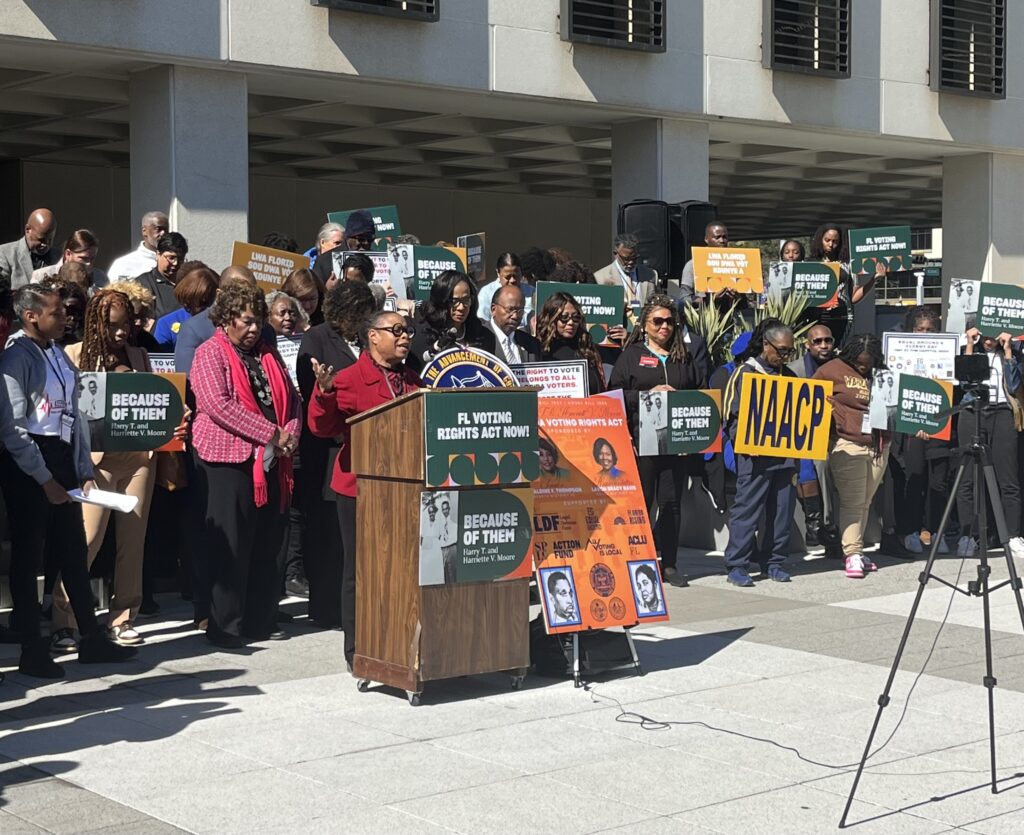
Photo credit: Cynthia Frage
State Senator Geraldine Thompson and Representative LaVon Bracy Davis teamed up to file the second Voting Rights Act bill — the Harry T. & Harriette V. Moore Florida Voting Rights Act (SB 1522/HB 1035) — in the state of Florida.
They also hosted Wednesday’s “Mass Voting Rights Rally,” attended by more than 100 individuals, outside the Capitol to fight against discriminatory voting practices in Florida.
Florida organizations such as Equal Ground, Legal Defense Funds, Florida Rising, All Voting is Local Action Fund, SPLC, NAACP, ACLU of Florida, and members of the Democratic House and Senate caucus signed on as co-sponsors.
The Voting Rights Act will make a request for a vote-by-mail ballot valid until the voter cancels the request and will revise the deadline by which the election supervisor should receive the vote-by-mail ballot. It would require a deadline extension in certain circumstances, and it will make election day a paid holiday so voters won’t have to lose work to go to the polls.
The founder of Equal Ground, Jasmine Burnet-Clark, said, “This bill is about access and true freedom. While our leaders are claiming that we live in a free state. If you followed the 2022 legislative session, you cannot help but question that viewpoint.”
This bill is named after the NAACP activist couple Harry T. and Harriette V. from Mims, Florida. Harry and Harriette were teachers at a Black elementary school where they received a lesser pay rate than their white counterparts. Harry Moore then started the Brevard County Branch of the NAACP in 1934, leading him to fight against injustices against Black Floridians’ voting rights and equal pay for the state’s Black teachers.
Their love for activism cost them their lives. On Christmas night, 1951, their 25th anniversary, a bomb placed by the Ku Klux Klan — exploded under their bed, claiming the life of Harry Moore. Then, a week later, Harriette passed.
At the time of their deaths, the Moores were able to register 31% of eligible voters, adding 116,000 Black Floridians to the Democratic Party over six years, giving Florida the bragging rights to the most registered Black Americans in the South.
Florida Gov. Ron DeSantis praised Florida for having the best voting system in the nation because “we don’t want anyone to cheat,” said DeSantis at the Tampa General Hospital in 2021.
“If we were the ‘gold standard’ then why do we need an election police that sets about arresting people who received a voter’s registration card from the stat e … and when they voted they were arrested and put in jail,” said Sen. Thompson at Wednesday’s rally. “So if Florida is the ‘gold standard’ then why are they penalizing third-party voter registration groups who want to help them to participate in our democracy?”
During last year’s session, the Florida Legislature passed Senate Bill 7050 (SB7050), which imposed severe restrictions on voter registration activities. According to The Guardian, about 26 voter registration groups were hit with more than $100,000 in fines.
With all of the voter restriction bills proposed in the Florida Legislature, Rep. Davis refers to his fellow lawmakers as bullies.
“I have learned the definition of a bully, a person who habitually seeks to harm or intimidate those they perceive as vulnerable,” Davis said. “I come to serve notice on all the Tallahassee bullies that backup is here. Our rights to equal access to the voting box are in trouble. Our returning citizens and formerly incarcerated are being intimidated by this newly formed election police form. We are here to battle bullies.”
Florida lawmakers signed off on a $1.4 million budget last year allowing more money for an election investigation officer. In August alone, that office arrested 20 people for being ineligible to vote in the 2020 election, and these were the same people who the DeSantis administration told that they could legally vote.
A 69-year-old Black woman, Marsha Ervin became a victim of the election investigation. She was arrested from her home at 3 a.m. for alleged voter fraud. Ervin was convicted of assault in 2016, but she was released in 2018. She then went and re-registered to vote for the 2020 election, where she received a voter registration card.
After a few months of investigation, her charges were dropped by State Attorney Jack Campbell.
Mutaqee Akbar, Ervin’s attorney and the Tallahassee NAACP president, spoke at the rally. He said Ervin was excited about voting.
“She told me how she was on her way out of prison in 2018, and she saw a headline that said felons can now vote. When she got out, the first thing she did was apply to vote,” he said.
Ervin was on probation when she voted, which caused her to be arrested, but the instructions on how or when a former felon could vote were not made clear.
Ervin was not the only former convicted felon who needed clarification about how this law applied to them. The 4th Amendment was approved to restore voting rights to 1.4 million past felons. DeSantis required their past legal and financial obligations and felony probation to be cleared before becoming eligible.
“There is nothing wrong with making sure that there is integrity and fairness [in voting] but fairness goes out the window when you make it difficult for people to vote,” Sen. Thompson said.
With the adoption of this bill, Floridians would be able to take back some control.
“We are here to send a message that we know you want to turn the clock back, but the only clock you [Florida legislature] gonna turn back on us is the one for daylight saving time,” Sen. Thompson said.